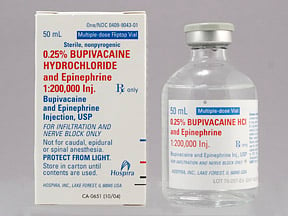
Bupivacaine-epinephrine Coupons & Savings Card – Discount Prices from $1.01
Generic for: Marcaine/epinephrine, Sensorcaine/epinephrine
Bupivacaine with epinephrine is a combination medication used to provide local or regional anesthesia during various medical procedures, including surgeries, dental work, and childbirth. Bupivacaine is a long-acting local anesthetic that works by blocking nerve signals in the body, leading to numbness in the targeted area. Epinephrine, a vasoconstrictor, is added to this formulation to constrict blood vessels at the injection site, which slows the absorption of bupivacaine into the bloodstream. This not only prolongs the anesthetic effect but also reduces the risk of systemic side effects. The combination is administered by healthcare professionals through various techniques, such as infiltration, nerve blocks, or epidural injections, depending on the procedure and the area requiring anesthesia. While generally effective and safe when used appropriately, it's important to be aware of potential side effects, including low blood pressure, dizziness, or, in rare cases, allergic reactions. Patients should discuss their medical history and any concerns with their healthcare provider before receiving this anesthetic combination.
Our coupons are free to use. Before paying, show the pharmacist your Bupivacaine-epinephrine savings card to get your free discount. Use our filters below to edit the prescription box to match your needs. The Bupivacaine-epinephrine prices will update based on your prescription needs. Above our Bupivacaine-epinephrine coupons, you can change your location to see pharmacy prices and costs in other areas. We're here to help you buy Bupivacaine-epinephrine at the lowest price with our prescription discount card.
My prescription
Edit
10ML of 0.25%-1:200000, Bupivacaine-epinephrine (1 Vial)
Select pharmacy

CVS
$22.31
COUPON PRICE
Walmart
$1.01
COUPON PRICE
Albertsons
$4.66
COUPON PRICE
Walgreens
$4.66
COUPON PRICEBupivacaine-epinephrine savings card
Show this card to your pharmacist
Walmart
$1.01
BIN
ID
PCN
GRP
019876
LH0D9395A4
CHIPPO
LHX
Powered by
Bupivacaine with epinephrine is a combination medication used to provide local or regional anesthesia during various medical procedures, including surgeries, dental work, and childbirth. Bupivacaine is a long-acting local anesthetic that works by blocking nerve signals in the body, leading to numbness in the targeted area. Epinephrine, a vasoconstrictor, is added to this formulation to constrict blood vessels at the injection site, which slows the absorption of bupivacaine into the bloodstream. This not only prolongs the anesthetic effect but also reduces the risk of systemic side effects. The combination is administered by healthcare professionals through various techniques, such as infiltration, nerve blocks, or epidural injections, depending on the procedure and the area requiring anesthesia. While generally effective and safe when used appropriately, it's important to be aware of potential side effects, including low blood pressure, dizziness, or, in rare cases, allergic reactions. Patients should discuss their medical history and any concerns with their healthcare provider before receiving this anesthetic combination.
Our coupons are free to use. Before paying, show the pharmacist your Bupivacaine-epinephrine savings card to get your free discount. Use our filters below to edit the prescription box to match your needs. The Bupivacaine-epinephrine prices will update based on your prescription needs. Above our Bupivacaine-epinephrine coupons, you can change your location to see pharmacy prices and costs in other areas. We're here to help you buy Bupivacaine-epinephrine at the lowest price with our prescription discount card.
Bupivacaine-epinephrine dosage forms
Use our Bupivacaine-epinephrine 10ML of 0.25%-1:200000 coupon with prices from $1.01 for 1 Vial. You can also use our Bupivacaine-epinephrine 10ML of 0.5%-1:200000 coupon with prices from $1.01 for 1 Vial. We have a Bupivacaine-epinephrine 10ML of 0.5%-1:200000 coupon with prices from $3.39 for 2 Vials. You can use our Bupivacaine-epinephrine 10ML of 0.5%-1:200000 coupon with prices from $7.57 for 3 Vials.
Dosage Quantity Price from Per unit 10ML of 0.25%-1:200000 1 Vial $1.01 $1.01 10ML of 0.5%-1:200000 1 Vial $1.01 $1.01 10ML of 0.5%-1:200000 2 Vials $3.39 $1.70 10ML of 0.5%-1:200000 3 Vials $7.57 $2.52 10ML of 0.25%-1:200000 2 Vials $2.83 $1.42 10ML of 0.25%-1:200000 3 Vials $6.74 $2.25
| Dosage | Quantity | Price from | Per unit |
|---|---|---|---|
| 10ML of 0.25%-1:200000 | 1 Vial | $1.01 | $1.01 |
| 10ML of 0.5%-1:200000 | 1 Vial | $1.01 | $1.01 |
| 10ML of 0.5%-1:200000 | 2 Vials | $3.39 | $1.70 |
| 10ML of 0.5%-1:200000 | 3 Vials | $7.57 | $2.52 |
| 10ML of 0.25%-1:200000 | 2 Vials | $2.83 | $1.42 |
| 10ML of 0.25%-1:200000 | 3 Vials | $6.74 | $2.25 |
